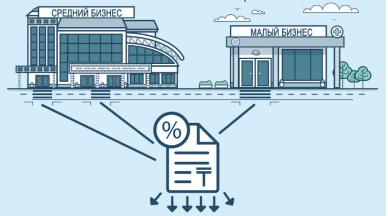The blog of the Ombudsman for the Protection of the Rights of Entrepreneurs of Kazakhstan was created for you to have an opportunity to appeal directly to me and I hope that it will contribute to a constructive dialogue between us – send me feedback, share opinions, make suggestions. All your comments without exception will be read by me.
Сorporate income tax transferred to local budgets in Kazakhstan
Collage by Vadim Kvyatkovskiy
It is expected that this will contribute to the growth of regional economic activity.
According to the estimates of the Ministry of National Economy of Kazakhstan, thanks to fiscal decentralization, regional budgets in 2020 will be replenished by KZT 386.4 billion, and in the next two years, it will be replenished by KZT 428.8 billion and 471.4 billion, respectively. The calculation logic of the Ministry of Economy is based on a simple idea: the more SMEs in the region, the more corporate income tax will go to the local budget. This means that the regional authorities will do their best to develop small and medium businesses.
In a conversation with the journalist of the Kursiv, the Vice-Minister of National Economy Zhaslan Madiev once again confirmed that his office expects akims' interest in the growth of the tax base in their regions. "Those tax revenues, which the regions will collect from SMEs, they can use on their development programs. In general, the task of the state is as follows: to help grow from micro and small businesses to medium and large. Therefore, the initiative to transfer the CIT from small and medium businesses to the regions will help to solve this problem, it will be a good motivator for the akimats to do everything so that business would consolidate and tax collection, respectively, would grow," Madiev said.
The CIT in numbers
Corporate income tax in Kazakhstan until 2020 was credited to the state budget at a rate of 20% on withholding it from taxable income. There are exceptions: legal entities - agricultural producers and producers of aquaculture products (in other words - fish farming) pay CIT at the rate of 10%.
The withholding rate of CIT on resident income is 15 percent. There is a gradation on CIT rates for non-residents - from 5 to 20%, but it will not have a special impact on replenishment of the local budget, as 100, 000 taxpayers - representatives of small and medium businesses, which will provide the same KZT386.4 billion of revenues to local budgets in 2020 are the residents of Kazakhstan.
In 2019, the budget received KZT1 trillion 974 billion 763 million in the form of the CIT, including KZT422 billion 371 million from SMEs, which is about one fifth. It should be noted that not all representatives of small businesses in the regions are CIT payers, as they work in special tax regimes - on a patent, simplified declaration or single land tax, the rates of the special tax regimes are 2-3%.
And just these representatives of small and micro businesses will be exempt from income tax for three years. Finance Minister Alikhan Smailov estimates that the loss of the budget from these tax holidays will amount to KZT 200 billion. Finance Minister Ruslan Dalenov reduced the losses to KZT 109 billion in 2020 and promised to reimburse them with transfers from the republican budget two months later. His deputy, Zhaslan Madiev, said the three-year government-backed moratorium is even useful for local budgets. "According to the moratorium, micro and small businesses are exempt from taxation, but this is a temporary measure. During the time of the moratorium, the business will be able to strengthen itself, and there is a great chance that it will move from the category of small to medium business," said the deputy minister.
The way to develop business
At the stage of discussion of the Concept of the Law of the Republic of Kazakhstan "On introduction of amendments and additions to some legislative acts of the Republic of Kazakhstan on issues of administrative-territorial structure of the Republic of Kazakhstan, improvement of the system of public administration, inter-budgetary relations, crediting and education" and, namely, this document made amendments on transfer of CIT to regional budgets because several positive examples from international experience were presented during the discussion.
In Spain, one of the main taxes received by the local (municipal) budget is the tax on economic activities, which is partly similar to Kazakhstan's corporate income tax from medium and small businesses. Payers of this tax are legal entities and individuals engaged in business activities. The economic activity tax gives local budgets 3.4% of total income. This tax, as noted in the concept, was introduced to strengthen control over the collection of taxes from small and medium-sized businesses, which is the basis of the Spanish economy.
It was also mentioned in the concept that in Japan one of the main taxes received by the local budget is the prefectural income tax and its payers are legal entities. Another example was Germany, which stated that "Germany's financial system for local budgets has been improved and is also aimed at increasing the revenue to the local budget through the development of entrepreneurship".
The authors of the concept noted that the introduction of the experience of these countries in Kazakhstan "will lead to stimulation of local executive bodies to expand the tax base and increase local budget revenues, as well as increased interest of regions in the development of small and medium businesses.
How to push small businesses to grow
Nurzhan Altayev, Mazhilis deputy, sees two main problems in the decision to make the local budgets dependent on CIT revenues. The first is related to the uneven distribution of small and medium-sized businesses in different parts of the country. Therefore, the centre will still have to redistribute the total boiler of budget revenues, the MP said. The second is those small businesses do not want to grow to the size of the average and try to be the same, preferring to crush their businesses. According to Altayev, the choice of this scheme is primarily due to the tax burden. He is sure that if it is reduced for each individual enterprise, the state will eventually collect more by increasing the number of medium-sized businesses (they are now, according to Atameken, only 22,000 of those 100, 000 payers in the local budgets).
"For example, the level of VAT threshold was lowered. Now, having quite a small turnover, you become a VAT payer. This will make the business now again split into some small IEs in order not to pay VAT. Here, the government needs to think again and do everything possible to reduce the tax burden on individual businesses, because then more money can be collected for the budget," Altayev said.
Olzhas Khudaibergenov, senior partner at the Centre for Strategic Studies, agrees with this opinion. He is convinced that the reason why small businesses are reluctant to move to medium business is the wrong taxation. This problem can be solved by introducing simplified taxation in certain sectors - for example, in agriculture and retail trade. "It is possible to introduce a single agrarian tax, or sales tax, a retail tax, to make one simple rate there and give up gradation, some limits. Then the motivation for crushing will disappear in medium-sized businesses; it will have no reason to show itself to be small at the expense of budding. But that doesn't depend on the local authorities, and neither does the State Revenue Committee. It depends more on the Ministry of National Economy and the Ministry of Finance, which determine the fiscal policy in the country," says Khudaibergenov.
The idea of both taxes is being discussed, according to Khudaibergenov, who is a presidential adviser. And there is a reservation about the retail tax: the thresholds for raising rates will be different for non-cash and cash payments. "Let's say, through digitalization, they will try to simplify taxation: you work without pay - you have lower rates, it's more profitable for you," concluded Khudaibergenov.
Dmitriy Pokidaev
Read more: https://kursiv.kz/news/ekonomika/2020-02/v-kazakhstane-kpn-peredali-v-mestnye-byudzhety








